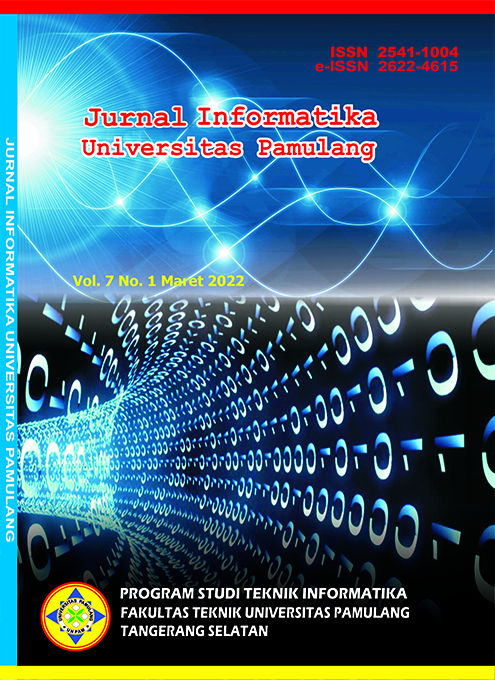Pengujian Black Box pada Aplikasi Penjualan Berbasis Web Menggunakan Metode Equivalence Partitioning
DOI:
https://doi.org/10.32493/informatika.v7i1.16194Keywords:
Application, Blackbox, Equivalence PartitioningAbstract
In a program or software certainly has some shortcomings in terms of comfort and accuracy to the needs of users (users), such as errors in user appearance, as well as effectiveness in the use of programs. Therefore, a way is needed to be able to fix the deficiency, by testing the program before it is used to the user. And the test is one way to determine whether a software has met the needs of users and specifications or still does not meet. If there is no checking process first, it can cause data error. With these problems, of course, it will hinder the use of the application. Therefore, the validation process is very considered. An application can be said to be of quality if it has gone through the testing stage. In the above, we conducted a blackbox test using the Equivalence Partitioning method, which can be interpreted as solving or dividing a program in the form of a domain that is entered into a data class in order to get a test case. Using this method, we earned quite varied points to test web application sales. The test in question includes things such as the design of the test scenario, the determination of the data to be tested, the test trial, the range of values, the determination of program functionality, conformity with existing databases, the results of documented research, to the conclusions obtained. The conclusion of testing using this method is that this application can run properly by meeting the criteria that meet the user's needs.
References
Adi, R. P., Koswara, Y., Tashika, J., Devi, Y., & Saifudin, A. (2020). Pengujian Black Box pada Aplikasi Pertokoan Minimarket Menggunakan Metode Equivalence Partitioning. Jurnal Teknologi Sistem Informasi Dan Aplikasi, 3(2), 100. https://doi.org/10.32493/jtsi.v3i2.4695
Febrian, V., Ramadhan, M. R., Faisal, M., & Saifudin, A. (2020). Pengujian pada Aplikasi Penggajian Pegawai dengan menggunakan Metode Blackbox. Jurnal Informatika Universitas Pamulang, 5(1), 61. https://doi.org/10.32493/informatika.v5i1.4340
Jaya, T. S. (2018). Pengujian Aplikasi Dengan Metode Blackbox Testing Boundary Value Analysis (Studi Kasus: Kantor Digital Politeknik Negeri Lampung). Jurnal Informatika: Jurnal Pengembangan IT (JPIT), 3(2), 45–48.
Maulana, A., Kurniawan, A., Keumala, W., Sukma, V. R., & Saifudin, A. (2020). Pengujian Black Box pada Aplikasi Penjualan Berbasis Web Menggunakan Metode Equivalents Partitions (Studi Kasus: PT Arap Store). Jurnal Teknologi Sistem Informasi dan Aplikasi, 3(1), 50-56. doi:10.32493/jtsi.v3i1.4307
Priyaungga, B. A., Aji, D. B., Syahroni, M., Aji, N. T. S., & Saifudin, A. (2020). Pengujian Black Box pada Aplikasi Perpustakaan Menggunakan Teknik Equivalence Partitions. Jurnal Teknologi Sistem Informasi Dan Aplikasi,3(3), 150. https://doi.org/10.32493/jtsi.v3i3.5343
Putra, A. P., Andriyanto, F., Karisman, K., Harti, T. D. M., & Sari, W. P. (2020). Pengujian Aplikasi Point of Sale Menggunakan Blackbox Testing. Jurnal Bina Komputer, 2(1),74–78. https://doi.org/10.33557/binakomputer.v2i1.757
Shadiq, J., Safei, A., & Loly, R. W. R. (2021). Pengujian Aplikasi Peminjaman Kendaraan Operasional Kantor Menggunakan BlackBox Testing. INFORMATION MANAGEMENT FOR EDUCATORS AND PROFESSIONALS : Journal of Information Management, 5(2), 97. https://doi.org/10.51211/imbi.v5i2.1561
Shaleh, I. A., Yogi, J. P., Pirdaus, P., Syawal, R., & Saifudin, A. (2021). Pengujian Black Box pada Sistem Informasi Penjualan Buku Berbasis Web dengan Teknik Equivalent Partitions. Jurnal Teknologi Sistem Informasi Dan Aplikasi, 4(1), 38. https://doi.org/10.32493/jtsi.v4i1.8960
Susanto, J., Biqirrosyad, B., Junaidi, M. M., Sudrajat, Y., & Desyani, T. (2021). Pengujian Black Box pada Aplikasi Desktop Penjualan Elektronik Menggunakan Metode Equivalence Partitioning. Jurnal Teknologi Sistem Informasi Dan Aplikasi, 4(1), 52. https://doi.org/10.32493/jtsi.v4i1.8519
Vikasari, C. (2018). Pengujian Sistem Informasi Magang Industri dengan Metode Blackbox Testing Boundary Value Analysis. Syntax : Jurnal Informatika, 7(1), 44–51. https://journal.unsika.ac.id/index.php/syntax/article/view/1291
Wijaya, Y. D., & Astuti, M. W. (2021). Pengujian Blackbox Sistem Informasi Penilaian Kinerja Karyawan Pt Inka (Persero) Berbasis Equivalence Partitions. Jurnal Digital Teknologi Informasi, 4(1), 22. https://doi.org/10.32502/digital.v4i1.3163
Yudhistiro, K., Sulaksono, A. G., & Pratama, A. H. (2021). Video Detection ( Studi Kasus Deteksi Demam / Covid-19 ). 11, 16–21.
Downloads
Published
Issue
Section
License
Authors who publish with this journal agree to the following terms:
- Authors retain copyright and grant the journal right of first publication with the work simultaneously licensed under a Creative Commons Attribution-NonCommercial 4.0 International (CC BY-NC 4.0) that allows others to share the work with an acknowledgement of the work's authorship and initial publication in this journal.
- Authors are able to enter into separate, additional contractual arrangements for the non-exclusive distribution of the journal's published version of the work (e.g., post it to an institutional repository or publish it in a book), with an acknowledgement of its initial publication in this journal.
- Authors are permitted and encouraged to post their work online (e.g., in institutional repositories or on their website) prior to and during the submission process, as it can lead to productive exchanges, as well as earlier and greater citation of published work (See The Effect of Open Access).
Jurnal Informatika Universitas Pamulang have CC-BY-NC or an equivalent license as the optimal license for the publication, distribution, use, and reuse of scholarly work.
In developing strategy and setting priorities, Jurnal Informatika Universitas Pamulang recognize that free access is better than priced access, libre access is better than free access, and libre under CC-BY-NC or the equivalent is better than libre under more restrictive open licenses. We should achieve what we can when we can. We should not delay achieving free in order to achieve libre, and we should not stop with free when we can achieve libre.
Jurnal Informatika Universitas Pamulang is licensed under a Creative Commons Attribution-NonCommercial 4.0 International (CC BY-NC 4.0)
YOU ARE FREE TO:
- Share : copy and redistribute the material in any medium or format
- Adapt : remix, transform, and build upon the material for any purpose, even commercially.
- The licensor cannot revoke these freedoms as long as you follow the license terms





